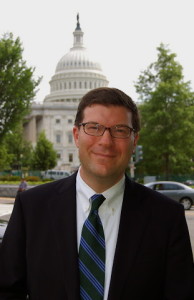We continue the Wisconsin installment of the “Advocating on the Road” series with this piece.
By the Rev. Andrew Genszler, ELCA Director of Advocacy
Part of my role as director of Advocacy is to travel to synods, congregations and seminaries around the country, speaking about our public witness as advocates. Last week I, too, went on the road to Wisconsin, to speak at an event in Eau Claire that focused on our church’s need for a new approach to engaging our communities and new language to guide our work for justice and reconciliation. I said that advocacy arising from our shared lives of discipleship and service in community — and without the political baggage — can unite rather than divide us, and can be a natural outgrowth of our faith.
As the recent “Advocating on the Road” pieces have highlighted, ELCA members living in Wisconsin have experienced relationships that were broken and frayed because of political disagreements over controversial issues. Unfortunately, Wisconsinites are not alone; people across the country have felt the bitter impact of a deepening polarization in our country too. There is no doubt that each of us holds varying political opinions, and it seems, especially in the final days of a long and bitter campaign season, that these differences separate us.
Just this morning, however, The Washington Post featured a story about two neighbors in Northern Virginia — one is a Republican and the other is a Democrat. The Post writes, “Both neighbors believe deeply in their views of the world. And both would drop everything to help the other. That’s what neighbors do, after all. Even if one has signs for Mitt Romney … on his lawn and the other has signs for Barack Obama …” Both neighbors are Catholic, who actively serve their community, value education, and are dedicated parents. While they may disagree on what specific policies best advance the common good or which candidate best embodies this ideal, both neighbors believe they have an obligation beyond themselves; each turns to the other.
Political opinions do not make up our entire person, comprise our total community engagement or even serve as a platform for how we advocate. Instead, it is this concern for our neighbor that serves as a better platform for more effective and faithful advocacy, and it can also act to unite where congregations are otherwise divided.
It is easy to take stock of the bitterness we experience around us, but it is more important for us to remember that, as Lutherans, we are united by our belief in a resurrected Christ, through whom we receive the gift of grace which frees us to love and serve our neighbors. Luther frequently wrote on how governments can be powerful agents in advancing the common good. One of his most developed themes is the idea that government—a “left hand” or “rule” or “kingdom” of God—is a gift to us from an active, loving God; an instrument to be used to help serve neighbor. And when our government becomes profoundly dysfunctional, we have a responsibility to our neighbors not to throw up our hands and walk away to our own isolated lives, but to remind public officials of their role in God’s good purpose for communities and for creation.
Coupled with this helpful understanding of government, advocacy that comes from our shared service in our community truly can be common ground in the midst of disagreement; even as our ELCA congregations continue to be places that foster meaningful and healthy discourse, Lutherans speaking to public officials about our common service to and concern for our neighbors is a compelling witness as a church. ELCA members are grounded in a common faith and a common mission to serve, and therefore it is out of this unity that faithful — and effective — advocacy grows.
ELCA members often say that we “seek justice” as one expression of our faith. As the Rev. Gerd Bents, an organizer of the Eau Claire event, said, we are called to help co-create a world worthy of trust, restoring relationships on the way — we can then point to “justice” as a result. We are better than individualized least-common-denominator politics as a nation. We can find common ground, and we can find ourselves in mutual service to and advocacy for our neighbors and communities.

